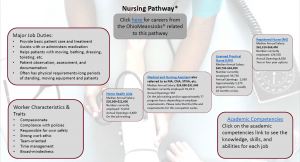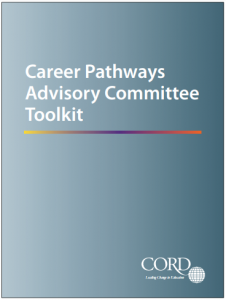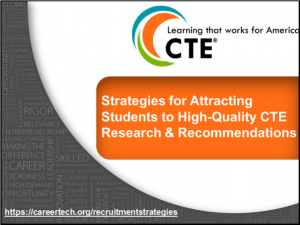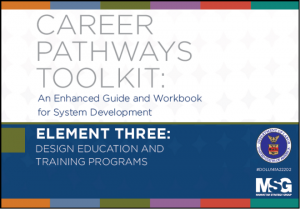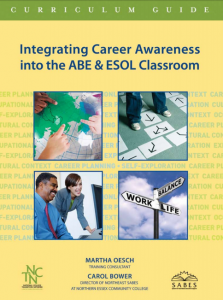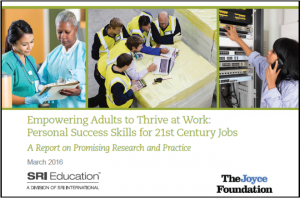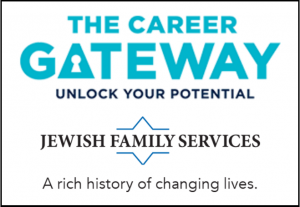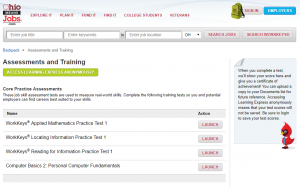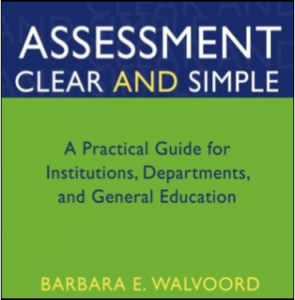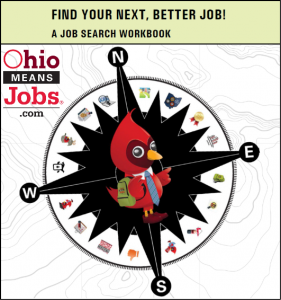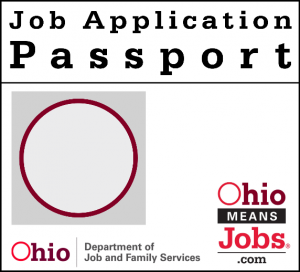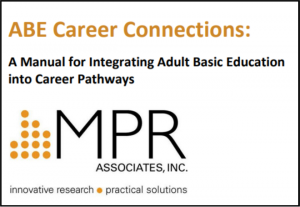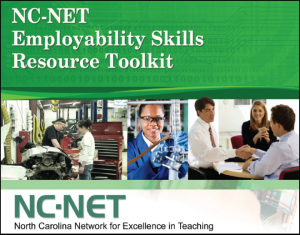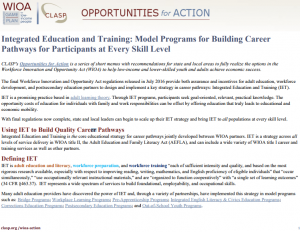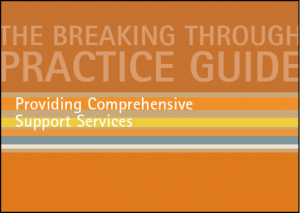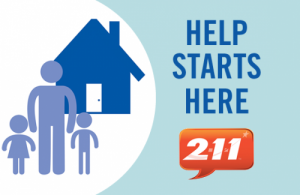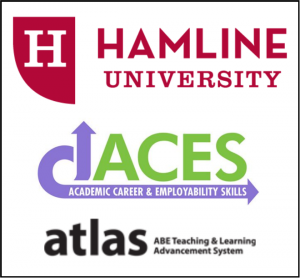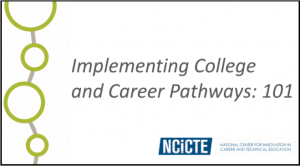Resources for Administrators
Career Ladders
This resource, from the Ohio Aspire Professional Development Network, is a statewide view of two career pathways based on Ohio Means Jobs® data. Additionally, a blank template has been developed for programs that would like to create regional-specific pathway(s). The career ladders allow program staff to demonstrate to students how they might progress through a particular pathway. The two developed ladders are as follows:
The ladders illustrate a possible career progression along with the median annual salary for the state of Ohio, the number currently employed, and the projected annual openings as well as the type of training an individual should expect to obtain for that job. Knowledge, skills, abilities, and WorkKeys scores are also provided for each job.
Partnerships and Alignment
This component of the Career Pathways Toolkit, from the U.S. Department of Labor, provides tools and techniques for
- Engaging Cross-Agency Partners and Employers;
- Establishing a Shared Vision, Mission, Goals, and Strategies;
- Defining the Roles and Responsibilities of all Partners; and
- Developing a Work Plan and/or Memorandum of Understanding for the Partnership.
Areas of particular interest to Ohio Aspire administrators and program staff are the checklists and worksheets for identifying potential partners, taking inventory of current partnerships, and clarifying the roles and responsibilities of partners – all of which may be used during the development of a Career Pathways Plan.
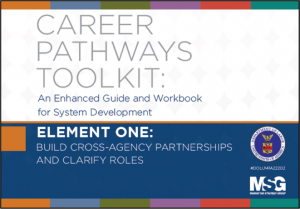
The Career Pathways Planner: A Resource Guide for Adult Education State Leaders to Promote Local Career Pathways Systems, a project of the Manhattan Strategy Group in collaboration with its partners Abt Associates and CORD Communications, includes information, strategies, tools, and links to existing resources that adult education administrators will find very helpful when designing, developing, and implementing a Career Pathways Plan.
An area of particular interest to Ohio Aspire administrators and program staff is Section 3: Supporting Partnerships which provides essential information, advice, and tools for
- Developing Local Partnerships,
- Steps to Form Partnerships,
- Collecting Information about Potential Partners, and
- Resources to Support Partnerships.
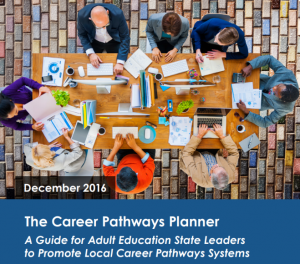
This toolkit, from The Center for Occupational Research and Development, aims to help educators and business representatives strengthen career and technical education programs through the use of advisory committees.
Areas of particular interest to Ohio Aspire administrators and program staff include
- Section II. Benefits of Advisory Committees,
- Section III. Setup of Advisory Committees,
- Section IV. Maintenance of Advisory Committees, and
- Section V. Growth of Advisory Committees.
Promotion, Environment, Intake, and Orientation
This website, from Advance CTE and the Siemens Foundation, houses a number of resources designed to help states and local communities attract and recruit students into high-quality career and technical education (CTE) programs. The two-pronged approach of sharing information about the benefits of CTE and recruiting students into CTE programs provides tools to support effective messaging to prospective students and stakeholders, such as local partners.
Areas of particular interest to Ohio Aspire administrators and program staff include brief fact sheets (such as The Value and Promise of Career Technical Education) that provide research and recruitment activities programs can use when sharing career pathways information with prospective and enrolled students.
This component of the Career Pathways Toolkit, from the U.S. Department of Labor, provides tools and techniques for researching and promoting work-based learning opportunities within business and industry.
Areas of particular interest to Ohio Aspire administrators and program staff include
- Component 3.1: Identify and Engage Education and Training Partners;
- Component 3.2: Identify Target Populations, Entry Points, and Recruitment Strategies; and
- Component 3.6: Research and Promote Work-Based Learning Opportunities within Business and Industry.
Individual Education, Career, and Life Plans
This curriculum guide, from National College Transition Network and SABES (System for Adult Basic Education Support), was created to provide adult education instructors tools and training to help students think about and plan for their life and career beyond the classroom. The guide includes classroom-ready resources, flexible lesson plans, handouts, and online resources to guide students through the career awareness and planning process.
Since the guide is comprised of individual lessons organized into units, Ohio Aspire administrators and program staff are encouraged to look at lesson titles to determine which lessons best meet the needs of students in their program.
This report, from SRI Education and the Joyce Foundation, emphasizes what it identifies as personal success skills – the Joyce Foundation’s chosen term to describe a multitude of elements (e.g., basic job readiness, self-directed learning, self-management, personal responsibility, effective communication, career management, and everyday problem solving) and the competencies needed to lay the foundation for personal success and navigate the working world.
Areas of particular interest to Ohio Aspire administrators and program staff include Chapter 5: Recommendations which sum up the principles of how adults learn and the approaches instructors can use to implement those principles with their students.
This Job Seeker’s Guide, from The Career Gateway at Jewish Family Services of Columbus, is designed to help enhance services provided by local education and employment programs. It provides a comprehensive listing of local and national online resources and the five sections reflect each step in managing a career:
- Step 1: Assess Yourself,
- Step 2: Explore Careers,
- Step 3: Create a Plan & Set Goals,
- Step 4: Expand Skills, and
- Step 5: Find a Job.
Areas of particular interest to Ohio Aspire administrators and program staff include the rich collection of online and local Ohio resources for each of the five steps located at the end of the guide, and the flexible format which permits for students to complete activities in print or online at http://pathwayoh.jobseekersguide.org/SetGoals.
Ongoing Assessment and Learning
This resource, from OhioMeansJobs.com, contains a collection of online practice tests and skill improvement resources for students in Ohio Aspire programs.
Areas of particular interest to Ohio Aspire instructors and program staff include The Applied Mathematics collection with four leveled modules, each of which is accompanied by Support Materials such as high school equivalency assessments, WorkKeys, ASVAB (Armed Services Vocational Aptitude Battery); career tests, including Nursing, Plumbing, Emergency Medical Technician (EMT), and Electrical; and modules to help improve computer, writing, and math skills.
This paper, by Dr. Barbara Walvoord, offers a concise, step-by-step guide that helps make student assessment simple, cost-efficient, and useful to both the student and the educational program. It contains effective strategies for meeting the requirements of state and federal education agencies, while showing how to use data to make informed program-level decisions that improve student learning.
Areas of particular interest to Ohio Aspire administrators and program staff include
- illustrative examples drawn from the author’s experience consulting with more than 350 institutions;
- a basic, no-frills assessment plan for departments and for general education;
- tips on how to integrate portfolios and e-portfolios into the assessment process;
- suggestions for using rubrics and alternatives to rubrics, including assessment for multidisciplinary work;
- clear instructions on how to construct a coherent institution-wide assessment system and explain it to boards/accreditors;
- ideas for assigning responsibility for general education assessment;
- strategies for gathering information about departmental assessment, while keeping the departmental workload manageable; and
- information on how to manage assessment in times of budgetary cutbacks.
Career Advising
This workbook, developed by the Ohio Department of Job and Family Services, improves student success with job searches by providing guidance on thinking outside the box, making good first impressions, discovering job postings that may not be listed online, crafting a resume, completing a job application, and putting their best foot forward during a job interview.
Areas of particular interest to Ohio Aspire administrators and program staff include guidance on how students can make the most of OhioMeanJobs.com, such as developing a career profile, developing career plans, finding apprenticeship opportunities, and researching careers of interest.
This tool, developed by the Ohio Department of Job and Family Services in partnership with OhioMeansJobs.com, is designed for student use both during a job search as well as during the application and interview processes.
Areas of particular interest to Ohio Aspire administrators and program staff include job search and interview techniques as well as assistance for students completing job applications or preparing for job interviews.
Instruction and Job Training Services
This manual, developed by MPR Associates – the same group responsible for the College and Career Readiness Standards for Adult Education, provides practical advice and numerous resources for program administrators at all phases of the development of a Career Pathways Plan.
Areas of particular interest to Ohio Aspire administrators and program staff are the appendices, which include tools and resources for the development and implementation of career pathways curricula; and the course development section, which includes activities on
- reviewing relevant texts and materials from other pathway courses,
- identifying content and industry skill standards addressed in the other courses,
- benchmarking the basic skills needed for postsecondary education and the occupational content and skills needed for employment,
- developing course objectives and lessons, and
- locating appropriate materials.
This toolkit, from North Carolina Network for Excellence in Teaching (NC-NET), provides support for adult education professionals to enhance how programs address the eight competencies identified by NC-NET as a priority for integration across the curriculum and crucial for student employability:
- Interpersonal Skills and Teamwork,
- Communications,
- Integrity and Professionalism,
- Problem Solving and Decision Making,
- Initiative and Dependability,
- Information Processing,
- Adaptability and Lifelong Learning, and
- Entrepreneurship.
Areas of particular interest to Ohio Aspire administrators and program staff include a module for each competency containing instructional materials, including activities, student handouts, assessment rubrics, and annotated presentation slides.
This resource, from The Center for Law and Social Policy (CLASP), provides information about IET and examples of IET from Bridge programs, Adult Education & Literacy programs, Workplace Learning programs, Pre-Apprenticeship programs, Integrated English Literacy & Civics Education programs, Corrections Education, Postsecondary Education, and Out of School Youth.
Areas of particular interest to Ohio Aspire administrators and program staff include the definition of IET and example of IET found in Adult Education & Literacy programs.
Support Services
This guide, from Jobs for the Future (JFF), helps practitioners serve adults in low literacy and math levels who want to succeed in postsecondary education.
Areas of particular interest to Ohio Aspire administrators and program staff include a table of academic, nonacademic, and material and financial supports as well as practical and innovative advice for developing and offering support services to reduce barriers to student persistence and retention.
This service, provided by United Way Worldwide, is a free, confidential referral and information service that connects people from all communities and of all ages to a specialist who will help find local support services.
This white paper, from Association of Community College Trustees and Single Stop USA, details the impact the Single Stop model has had on community college students as well as federal policy recommendations to support student success.
Areas of particular interest to Ohio Aspire administrators and program staff include support when participating in program-level discussions about support services as part of the development of a Career Pathways Plan.
Professional Development
These online professional development offerings, developed by ATLAS (the ABE Teaching and Learning Advancement System) and housed at Hamline University’s School of Education, provide information for program staff about the planning phases and promotion stages of a Career Pathways Plan.
Areas of particular interest to Ohio Aspire administrators and program staff include
- Topic 4: Effective Communication,
- Topic 5: Learning Strategies,
- Topic 6: Critical Thinking,
- Topic 7: Self-Management,
- Topic 8: Developing a Future Pathway, and
- Topic 9: Navigating Systems.
This series, from the National Center for Innovation in Career and Technical Education (NCICTE), offers approaches to help strengthen education professionals in their capacity to design and deliver standards-based, integrated curriculum and improve instructional practice.
Areas of particular interest to Ohio Aspire administrators and program staff include
- Module 1: Career Pathway Implementation 101,
- Module 2: Defining and Assessing College and Career Readiness,
- Module 3: Pathway Curriculum Development and the Common Core,
- Module 4: Developing Standards-Aligned Integrated Projects, and
- Module 5: Developing High-Quality Work-Based Learning Experiences and Systems.

